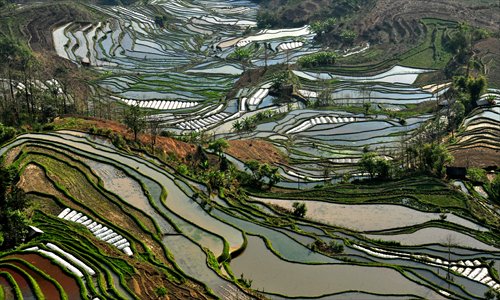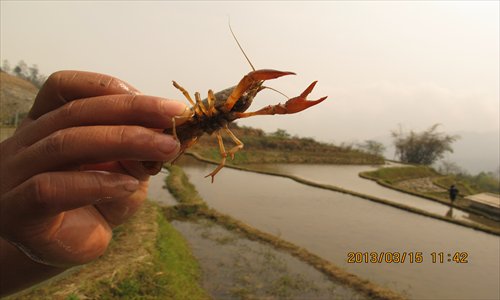Defeated by a pest invasion


Yang Fusheng, 50, never imagined that bright colors of the water and soil terraces near his home in Yuanyang county, Yunnan Province, could one day be muddied and destroyed by burrowing invaders.
The terraces, which were recently recognized by UNESCO as a World Cultural Heritage site, are under threat from crayfish that were introduced to the area in 2006. The crustaceans like to make their homes one meter below the soil's surface, and have hollowed out the muddy ridges of fields. As a result, many rice paddies have dried out as water drained away.
Around 5,000 acres of terraced fields were damaged by crayfish in 2012, prompting the Yuanyang government to spend 1.1 million yuan ($177,190) last year killing 3.7 million crayfish with pesticides.
"Crayfish quickly reproduce and spread, and they're cagey enough to escape when they detect pesticide or people coming after them," Yang told the Global Times.
This year, another 1.1 million yuan will be spent on the war against the lobster-like shrimp.
As an introduced species, crayfish have no natural predators in China and Yuanyang's battle has drawn attention to an often neglected area of biosecurity in China - invasive pest species.
Currently, there are over 400 kinds of invasive species across the country, which have endangered local species and damaged ecosystems, leading to an estimated 120 billion yuan in direct losses annually, the Beijing-based Science and Technology Daily reported.
From food to enemy
In the southern part of Yunnan Province, people grow rice and raise fish in the terraces around the villages. The Honghe River served as a water distribution system, a delicate balance that UNESCO described as "a unique and integrated ecological system."
This began to change in 2006, when a migrant worker who liked eating crayfish brought them to Yuanyang and raised some in his own rice paddy field, attracting many other villagers, who later presented each other with crayfish.
"People just liked to eat them, until one day they found that the crayfish population was getting out of control," Chen Wenguang, a researcher at the local agricultural and science bureau, told the Global Times.
More than pretty scenery is under threat. The local Hani and Yi ethnic minority groups rely on the rice fields to make a living.
As they found their fields collapsing beneath their feet, Yang and other villagers asked for help from the local government.
Noticing the threat to local tourism, the government banned all raising and selling of crayfish and gave out pesticides to every house. They then told the media that the situation was under control.
A nationwide invasion
The International Union for Conservation of Nature (IUCN) compiled a list of the 100 most invasive species in the world. Half of them already exist in China.
"The government either failed to notice or did not want to deal with the disruptive effects of invasive creatures," said Xie Yan, a professor from the Chinese Academy of Sciences and founder of the China Species Information System, adding that the main reason why Yuanyang authorities moved quickly was because the local economy was directly threatened.
According to Yang, the local government doesn't want to admit that they had been considering using the crayfish in their tourism plans.
In places like Zhejiang and Jiangsu provinces, as well as Shanghai, where most of China's crayfish are concentrated, crayfish is one of the favorite foods and governments encouraged raising them as a way to foster economic development.
Amazon snails, another invasive creature which is also a popular food, has the auspicious name Fu Shou Luo in China, which means "blessed spiral shell." These "blessed" snails have eaten up to a quarter of the paddy rice in Xinfeng county, Jiangxi Province, local news portal dajiang.com reported Tuesday.
A local farmer told the Global Times that they can raise this kind of snail easily because they are cheap and reproduce quickly.
"Many of those pests were introduced in for good reasons, but the lack of research into their true nature meant that there were negative results," Wan Fanghao, a professor with the Institute of Plant Protection at the Chinese Academy of Agricultural Sciences, told the Global Times.
In a similar misstep, water hyacinth was used by the environmental bureau in Kunming, the capital of Yunnan, to clean and improve the water quality of Dianchi Lake in 2011.
It worked, but the hyacinth multiplied so fast they soon filled the lake and blocked rivers, preventing boating. Last year, the Kunming government switched their focus from cleaning the water to removing the densely packed plants that had rotted and polluted the lake.
An official surnamed Li from the local environmental protection bureau told the Global Times on Tuesday that even though many experts said it was a risky strategy, using water hyacinth to clean the lake was one of the cheapest solutions.
Halfhearted fight?
"Whether they're pets, plants or food, invasive species share certain characteristics - a fast reproduction rate, low requirements for survival as well as cheap prices, which are the reasons why governments or businessmen like to use them to make money," Lü Zhi, a biological and environmental expert with Peking University, told the Global Times, adding that those profits are short-term.
Xie said it is almost impossible to eradicate invasive pests. "Even if the Yuanyang government uses excessive quantities of pesticides and sacrifices all the paddy rice, once they've arrived, they will stay."
Although experts say prevention is the best solution, Lü said some measures should be taken, "such as introducing predators of the invasive pests, controlling their reproduction through chemicals and preventing them from spreading."
Wan suggested that a system for reports of sightings should be established, so experts could update the list of invasive pests and prevent new invasions.
Wan said forming an expert panel in every province to monitor the invasive pests is also necessary, as the severity of problems caused by introduced pests differs from place to place. "Crayfish would not be so disruptive if they were not in the terraced fields."
Xie pointed out that it's an issue that authorities prefer to ignore. "Take the crayfish in Yuanyang. If there wasn't a 1,300-year-old terrace under threat, which makes money for the county, who would bother spending money to kill them?"